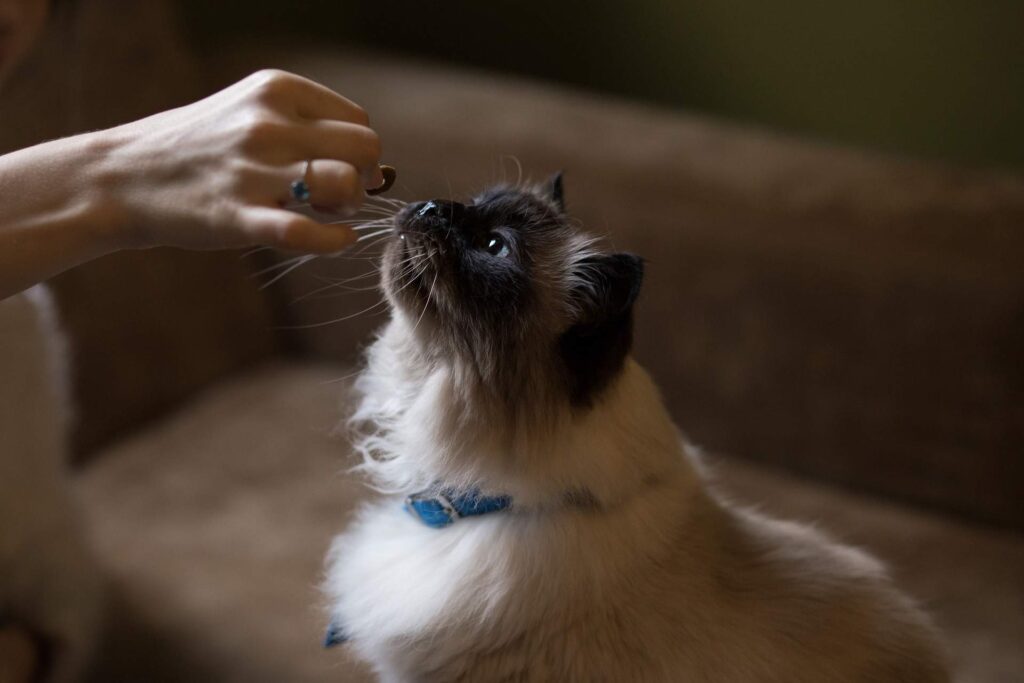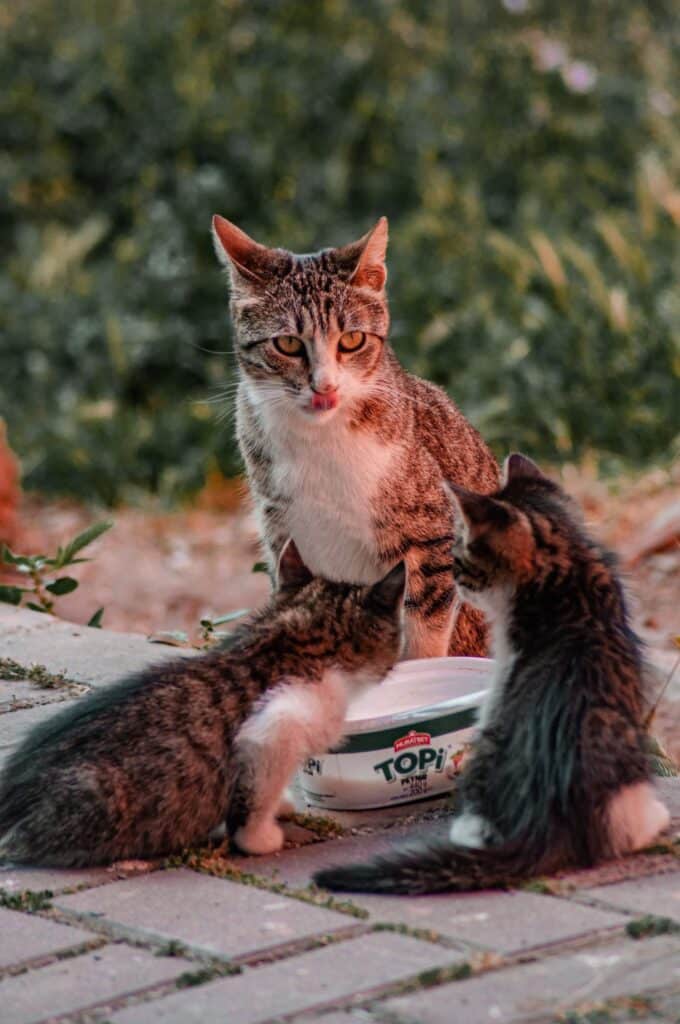One of the most loved foods in global gastronomy is cheese, in all of its forms and presentations. However, you might be wondering if can cats eat cheese or not ? Without going through all the history and work involved in its production, we can define cheese as a very tasty source of protein and fat and sophisticated, even though there are hundreds of different types of cheese, each with its aroma, texture, flavor, and nutritional makeup.
Table of Contents

As long as it is consumed in moderation, cheese has many positive effects on human health in addition to being palatable. And if you live with a feline companion, you are well aware of the fact that kittens typically find this food to be very alluring. . As a result, we respond to your question and explain whether cheese can be a healthy food for cats. We also outline the safety measures we must take if we choose to feed cheese to our kittens.
You may also be interested in: Can Cats Eat Rice?
Can cats eat cheese? Is cheese good for cats?
Since cheese is made from the milk of various mammals, it is a source of animal-derived protein. Although cow’s milk is used to make the majority of cheeses consumed worldwide, sheep, goat, and buffalo milk is also used to make some very fine cheeses. Cheese is a dairy product that also contains a significant amount of fat, although many varieties are low in calories and total fat. It also contains minerals like calcium, phosphorus, and magnesium.
Since cats are solely carnivorous creatures, proteins must serve as the foundation of their diet and are therefore the most abundant macronutrient, along with healthy fats, vitamins, and minerals. Although cats can consume very small amounts of carbohydrates, it is important to keep in mind that an excess of this nutrient can lead to digestive problems as well as promote the growth of feline obesity.
It might be reasonable to assume that cats can eat cheese given that it is a high-protein food that also contains some healthy fats. However, the situation is not as straightforward because most adult cats are lactose intolerant and cheese is also a direct derivative of milk. Below, we provide more details.
You may also be interested in: Why does my cat chew on me? 6 Reasons you should know.
Mother’s milk is the only ideal food to satisfy all of a kitten’s nutritional needs while it is lactating. As a result, your body makes a lot of the lactase enzyme, which is in charge of breaking down the lactose found in breast milk. However, as cats approach the end of their weaning period and are prepared to try new foods, their bodies gradually reduce the production of this enzyme. This is the most significant food transition a cat will ever go through because it signals that its body is getting ready to survive without the help of a human.
The majority of adult cats develop lactose intolerance because their bodies either don’t produce enough of the enzyme needed to properly digest lactose or don’t produce it at all. As a result, felines who consume milk or milk products may experience digestive issues like gas, vomiting, or diarrhea.
Since cheese is not one of the forbidden foods for cats, it should only be consumed in moderation to avoid such digestive issues. Additionally, it is important to note that cheese should not be used in place of meat, including beef, chicken, turkey, and fish, although it provides a good amount of protein and fat.

What kind of cheese can I give my cat?
Goat and sheep cheeses are simpler for our kittens to digest, although cow cheese is more affordable and convenient to find. To prevent the digestive issues caused by lactose intolerance in cats, it would be interesting to favor these types of cheese.
In this way, we can use the food that our cat loves so much to reward good behavior and encourage it to keep learning by giving our kittens a small piece of hard cheese as a prize during their education. However, it’s crucial to avoid using only food to reward cats for good behavior, as this could result in rapid weight gain or teach them that being obedient must always be accompanied by receiving food. The best way to reward your cat’s effort and intelligence are to alternate giving him or her snacks with cuddles, toys, praise, and fun times.
On the other hand, to supplement our kittens’ diets and satiate their voracious appetites, we can also add lean cheeses, like lean ricotta or cottage cheese, to the homemade dishes we prepare.
Can Cats Eat Cream Cheese?
Many cats enjoy dairy products. Although milk may upset the stomach of the majority of real cats, the stereotypical cat loves it. What about cream cheese, though? While cream cheese isn’t harmful to cats, it’s also not the best choice either.
Although cream cheese is a dairy product, it is much richer in fat and more concentrated than other dairy options. Although some cats adore this high-fat food, they might not be able to process it properly.
While some cats might be particularly drawn to cream cheese, others might not care much for it at all. Whether or not your cat manages to smuggle cream cheese every time you turn around, you might want to pause before giving your cat’s meal away. We’ll go over everything you should know before giving your cat cream cheese in this article.
Is there a safe dose of cheese that I can give my cat?
As we have seen, cats can always eat cheese in very small quantities, as a possible snack or a complement in homemade recipes. However, there is no predetermined dose for all cats, but the safe and beneficial amount of cheese must be appropriate according to the size, weight, age, and health status of each kitty.
Can cats eat cheese sticks?
Does cheese harm cats? Cats do not typically eat cheese as part of their diet. Cats are obligate carnivores, meaning that the only source of essential nutrients for them is meat. The delicate digestive system of a cat can be upset by cheese, despite the fact that it is also high in protein.
Can cats eat cottage cheese?
If can cats eat cheese they also can eat cottage cheese? In actuality, milk is a necessity for kittens because it can offer an adequate amount of protein and other nutritional elements. When it comes to cats, cheese, and other dairy products, it’s possible that the majority of pet owners are perplexed. However, feeding cats dairy products like cottage cheese generally causes their stomachs to be upset.
Can cats eat mac and cheese
Can cats eat cheese and mac ? Experts advise against feeding your cats any type of cheese, including mac and cheese. The high fat and carbohydrate content of mac and cheese can be harmful to your cat’s health. You should always stick to the diet your veterinarian has recommended.
For this reason, you must consult a veterinarian to choose the most appropriate diet according to the nutritional needs of your cat. The professional will be able to guide you regarding the introduction of cheese in your cat’s diet, advising you on the most appropriate and safe doses to obtain a positive impact on their health.
Source : Vet Cornell